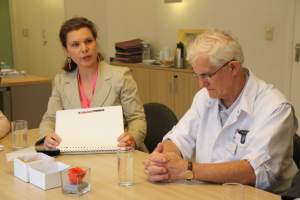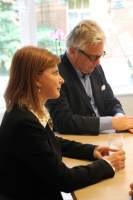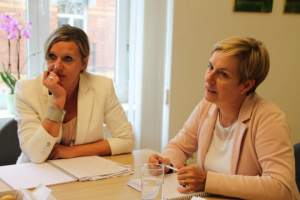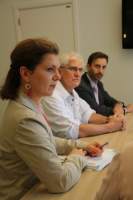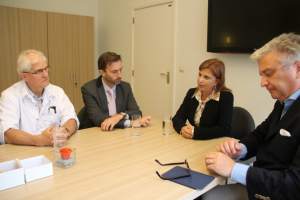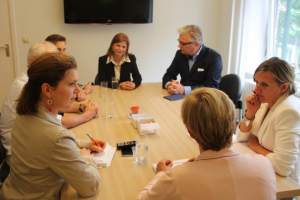 Share this!
Share this!On 29 September, AER President Dr Hande Özsan Bozatli, her special advisor Laurent of Belgium and the AER Secretary General Mr Mathieu Mori visited Saint-Pierre University Hospital with the aim of kick-starting AER’s work on the issue of health of migrants and refugees. The delegation was welcomed by Ms Patrice Buyck, Director General of CHU Saint-Pierre, Professeur Pierre Mols, Chief of Emergency Department, Ms Chloé Dungelhoeff, Communications Director and Ms Cécile Rubay, Patients’ Administrative Management.
Ms Agneta Granström, AER Committee 2 President, has urged AER members to act on this pivotal topic, underlining three main reasons:
- Migrants are becoming an increasing proportion of the population in Europe, therefore health professionals, managers and politicians need more knowledge on migrants’ health and ability to access care in order to make informed decisions.
- Illness may impede the integration processes in the host countries as ill health affects the ability to engage in education, work and activities in society in general. This may lead to further marginalisation and social isolation, which again may affect health in a negative way. Legal guidelines that guarantee access to health care and other social services support policies that aim to integrate migrants and benefit from their presence. Policies that keep migrants in camps and deal with their health needs through separate services will contribute to their marginalisation.
- Respect for the right to health requires migrant-sensitive health systems. This means services that are culturally and linguistically appropriate and pay attention to some unique health problems, including mental health disorders and trauma from injuries or torture.
Saint-Pierre University Hospital turned out to be an excellent starting point to grasp the challenges facing health 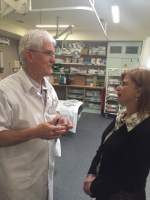 practitioners to care for migrants and refugees. Older than Belgium itself, the hospital is one of the 5 public hospitals in Brussels city (IRIS network). First established in the buildings of an ex-leprosarium in 1783, Saint-Pierre has safeguarded through time true values of solidarity, dedication and respect that seep through its walls and are carried by the numerous health professionals working in the institutions. Saint-Pierre believes and acts according to the idea that care should be provided to everyone, regardless social or political status. This reputation is known to other medical institutions in Brussels and neighbouring areas which have taken habit of sending patients to them when worried about the patients’ insurance coverage or political status. As a result, Saint-Pierre ends up with approximately 1 million EUR per year in equity with expenses unclaimed by neither the patients, health insurance nor the government.
practitioners to care for migrants and refugees. Older than Belgium itself, the hospital is one of the 5 public hospitals in Brussels city (IRIS network). First established in the buildings of an ex-leprosarium in 1783, Saint-Pierre has safeguarded through time true values of solidarity, dedication and respect that seep through its walls and are carried by the numerous health professionals working in the institutions. Saint-Pierre believes and acts according to the idea that care should be provided to everyone, regardless social or political status. This reputation is known to other medical institutions in Brussels and neighbouring areas which have taken habit of sending patients to them when worried about the patients’ insurance coverage or political status. As a result, Saint-Pierre ends up with approximately 1 million EUR per year in equity with expenses unclaimed by neither the patients, health insurance nor the government.
In order to fulfil its mission to provide care to all those who need it, including migrants, refugees and asylum seekers, Saint-Pierre employs 7 full-time inter-cultural mediators and can accommodate patients speaking 140 different translators. 27 social workers also assist the hospital administration to manage the necessary procedures for caring for migrants. The practitioners have identified several barriers when dealing with asylum seekers:
- specific needs and pathologies: their background and extensive travel result in specific needs but also bring with them certain diseases that are not so common in Europe
- more time to diagnose: when time permits and in order to reduce the costs of treatment, Saint-Pierre has adapted processes that take more time in the diagnosis, with one exam leading to another so as to ensure that each test is absolutely necessary. The hospital finds itself penalised by such practices as national regulation limits the number of days in the hospital for each patient.
- cultural differences: these are numerous of course, but one that seems to stand out is the mistrust of certain groups of people in the general practitioners and the tendency to go directly to hospital emergency rooms rather than consult a generalist.
Next steps
With this first awareness-raising visit, the President explained “we want to show our full support to Ms Granström in her proposal to deal with the health of refugees; it is highly relevant and AER can play its role by finding out how healthcare professionals and hospitals across Europe face these challenges and share their experiences”
Some figures about Saint-Pierre:
- 421.000 patients / year
- 82.000 emergencies / year
- 3.300 births / year
- 636 beds
- 2.500 employees
- 40 medical services
